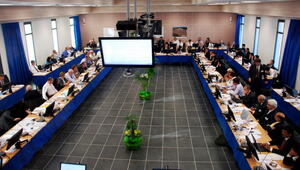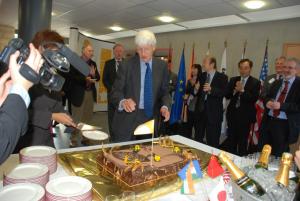ITER Council, fifth edition
Since the 1450s, when the Honoré de Berre invited his friends to hunt deer and wild boar on his property along the banks of the Durance River, the Château de Cadarache has witnessed many historical events. And when one day the chroniclers sharpen their pencils to write the history of the ITER Project, these medieval walls will certainly be mentioned as having set the background for many of the project's decisive meetings. This week, the Château once again turned into the stage for the ITER Project as the ITER Council, the governing body of the ITER Organization, convened for its fifth meeting since the inauguration of the project in 2007.
The meeting opened on Wednesday 18 November with a written address from Valérie Pécresse, the French Minister for Research and Higher Education, and Pierre Lellouche, the French State Secretary for European Affairs. The address, delivered by the General Administrator of the French Nuclear Energy Agency (CEA), Bernard Bigot, was intended to reaffirm the strong support of the European Union, France, and President Nicolas Sarkozy "... at [a] time when difficult programmatic and budgetary decisions are on the horizon." The address also stated: "...The most recent project reviews have in effect revealed cost increases and the necessity of carefully taking into account possible technical unknowns. This is not surprising for a project of this scale, and must in no way be an obstacle to its development and its success in the long term. ITER, as we all know, is one of the most ambitious worldwide scientific programs of all times. Its success in demonstrating controlled nuclear fusion over the next decades could well change for the better the way we all live on Earth, and allow future generations to benefit from an abundant and nearly inexhaustible form of energy that is respectful of our planet. What is at stake could affect every single person living on Earth, at a time when the world is preparing the Copenhagen Summit on climate change."
Following this address, Council Chairman Sir Christopher Llewellyn Smith opened the meeting by asking the delegates "... to step back and look at what we are doing here." When fossil fuels run out, there will be a big gap in energy resources. "Fusion is a gamble worth taking," he said, quoting a recent article on ITER in the British magazine New Scientist. "With ITER, we have come a long way from negotiation to confrontation, to collaboration. And we know that fusion is possible. Future generations will curse us if we do not try. And ITER is vital for fusion. Therefore we must build ITER as soon as possible."
For Llewellyn Smith it was the last meeting as Council Chairman. It was also the end of the ITER Agreement-mandated term of office for Bob Iotti, Chairman of the ITER Council Management Advisory Committee (MAC), and Predhiman Kaw, Chairman of the ITER Council Scientific and Technical Advisory Committee (STAC). "I would like to underline the outstanding work that has been done by the Chairs," said Director-General Kaname Ikeda on behalf of the ITER Organization. "Their devotion to ITER and their skills in bringing differing points of view into common agreement have laid the foundation for a strong and balanced project."
Former Vice-Chair Evgeny Velikhov from the Russian Federation was elected as new Chairman of the ITER Council. Velikhov is one of the masterminds behind the ITER Project, and has been President of the Kurchatov Institute in Moscow since 1992. Yuanxi Wan from China, also referred to as the father of the EAST tokamak, was appointed Chair of STAC, and Gyung Su Lee, President of the National Fusion Research Institute of Korea, was appointed Chair of MAC.
For further information on the Council's decisions, please read the Press Releases below ...
Click here to read the press release in English
Click here to read the press release in French




